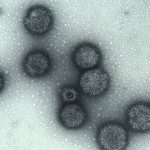Lien vers Pubmed [PMID] – 25805623
Lien vers HAL – pasteur-01453449
Lien DOI – 10.1016/j.ttbdis.2015.03.008
Ticks and Tick-borne Diseases, 2015, 6 (3), pp.393-400. ⟨10.1016/j.ttbdis.2015.03.008⟩
Reservoir competence is a key parameter in understanding the role of host species in the epidemiology of multi-host-especially vector-borne-pathogens. With this aim in view, we studied the reservoir competence of the Siberian chipmunk (Tamias sibiricus barberi) recently introduced into Europe, for the multi-host tick-borne bacteria, Borrelia burgdorferi sl, the agent of Lyme borreliosis. T. sibiricus were experimentally exposed to bites from Ixodes ricinus ticks infected with Borrelia burgdorferi sensu stricto and Borrelia afzelii, with subsequent assessment of bacteremia and antibody responses. Borrelia was detected in chipmunk blood samples, ear biopsies and organ necropsies, and in nymphs used for xenodiagnosis (at one and six months after the initial chipmunk infection) via both serological and molecular methods. In total, eight out of twelve chipmunks showed evidence of infection by Borrelia sp., either by ELISA or PCR. Five chipmunks developed an immune response against the bacteria one month after infection. Borrelia infection in at least one organ was observed in seven animals at 14, 38, 93 or 178 days post-infection. Xenodiagnosis was positive for one chipmunk at 38 days, but no longer at 178 days post-infection. Four chipmunks remained uninfected, despite similar infection pressures to those observed in the field. Taken together, these results suggest that chipmunks can be infected through Borrelia-infected tick bites, and can transmit Borrelia to nymphs, but do not remain persistently infected.




